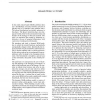Free Online Productivity Tools
i2Speak
i2Symbol
i2OCR
iTex2Img
iWeb2Print
iWeb2Shot
i2Type
iPdf2Split
iPdf2Merge
i2Bopomofo
i2Arabic
i2Style
i2Image
i2PDF
iLatex2Rtf
Sci2ools
COLT
2008
Springer
2008
Springer
Adapting to a Changing Environment: the Brownian Restless Bandits
In the multi-armed bandit (MAB) problem there are k distributions associated with the rewards of playing each of k strategies (slot machine arms). The reward distributions are initially unknown to the player. The player iteratively plays one strategy per round, observes the associated reward, and decides on the strategy for the next iteration. The goal is to maximize the reward by balancing exploitation: the use of acquired information, with exploration: learning new information. We introduce and study a dynamic MAB problem in which the reward functions stochastically and gradually change in time. Specifically, the expected reward of each arm follows a Brownian motion, a discrete random walk, or similar processes. In this setting a player has to continuously keep exploring in order to adapt to the changing environment. Our formulation is (roughly) a special case of the notoriously intractable restless MAB problem. Our goal here is to characterize the cost of learning and adapting to t...
| Added | 18 Oct 2010 |
| Updated | 18 Oct 2010 |
| Type | Conference |
| Year | 2008 |
| Where | COLT |
| Authors | Aleksandrs Slivkins, Eli Upfal |
Comments (0)

